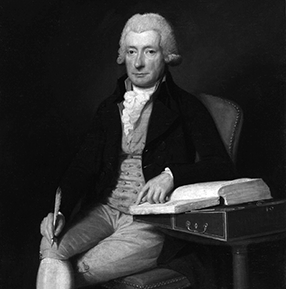Peace to the artist, whose ingenious thought
Devised the weather-house, that useful toy!
Fearless of humid air and gathering rains
Forth steps the man—an emblem of myself!
More delicate his timorous mate retires.
When Winter soaks the fields, and female feet,
Too weak to struggle with tenacious clay,
Or ford the rivulets, are best at home,
The task of new discoveries falls on me.
At such a season and with such a charge
Once went I forth, and found, till then unknown,
A cottage, whither oft we since repair:
'Tis perched upon the green hill-top, but close
Environed with a ring of branching elms
That overhang the thatch, itself unseen
Peeps at the vale below; so thick beset
With foliage of such dark redundant growth,
I called the low-roofed lodge the peasant's nest.
And hidden as it is, and far remote
From such unpleasing sounds as haunt the ear
In village or in town, the bay of curs
Incessant, clinking hammers, grinding wheels,
And infants clamorous whether pleased or pained,
Oft have I wished the peaceful covert mine.
Here, I have said, at least I should possess
The poet's treasure, silence, and indulge
The dreams of fancy, tranquil and secure.
Vain thought! the dweller in that still retreat
Dearly obtains the refuge it affords.
Its elevated site forbids the wretch
To drink sweet waters of the crystal well;
He dips his bowl into the weedy ditch,
And heavy-laden brings his beverage home,
Far-fetched and little worth: nor seldom waits
Dependent on the baker's punctual call,
To hear his creaking panniers at the door,
Angry and sad and his last crust consumed.
So farewell envy of the peasant's nest.
If solitude make scant the means of life,
Society for me! Thou seeming sweet,
Be still a pleasing object in my view,
My visit still, but never mine abode.
Credit
From The Task (1785) by William Cowper. This poem is in the public domain.
Date Published
01/01/1785

